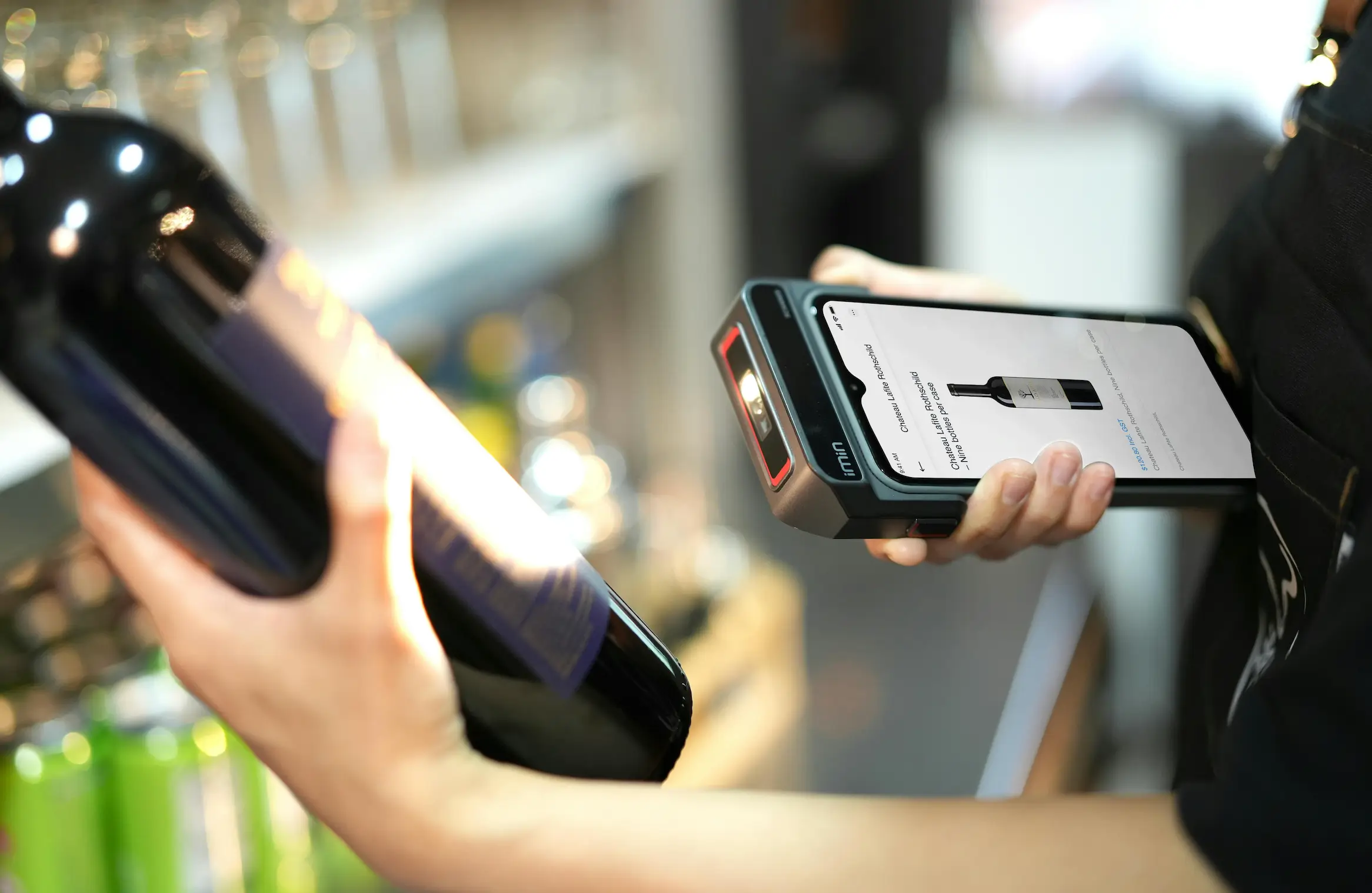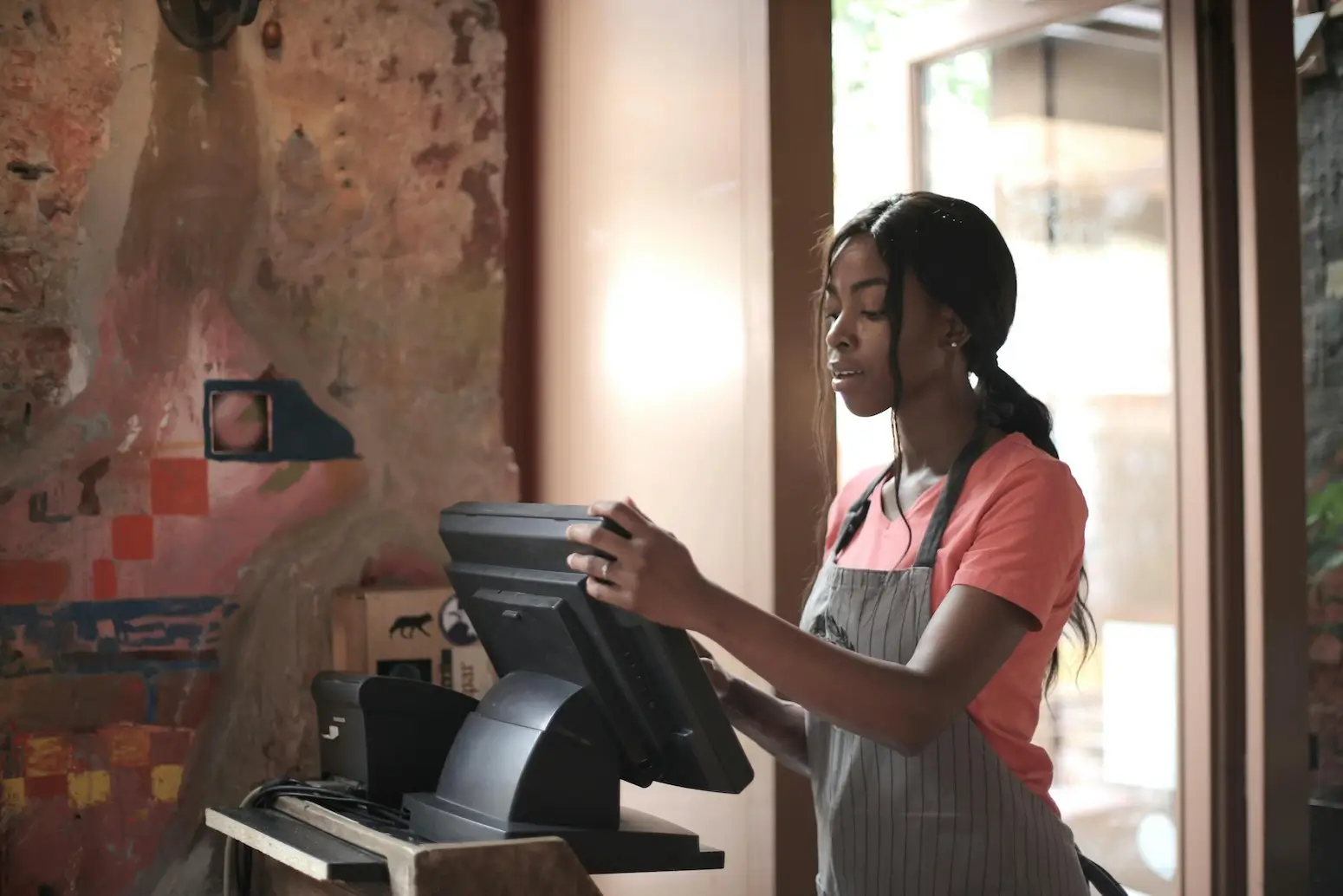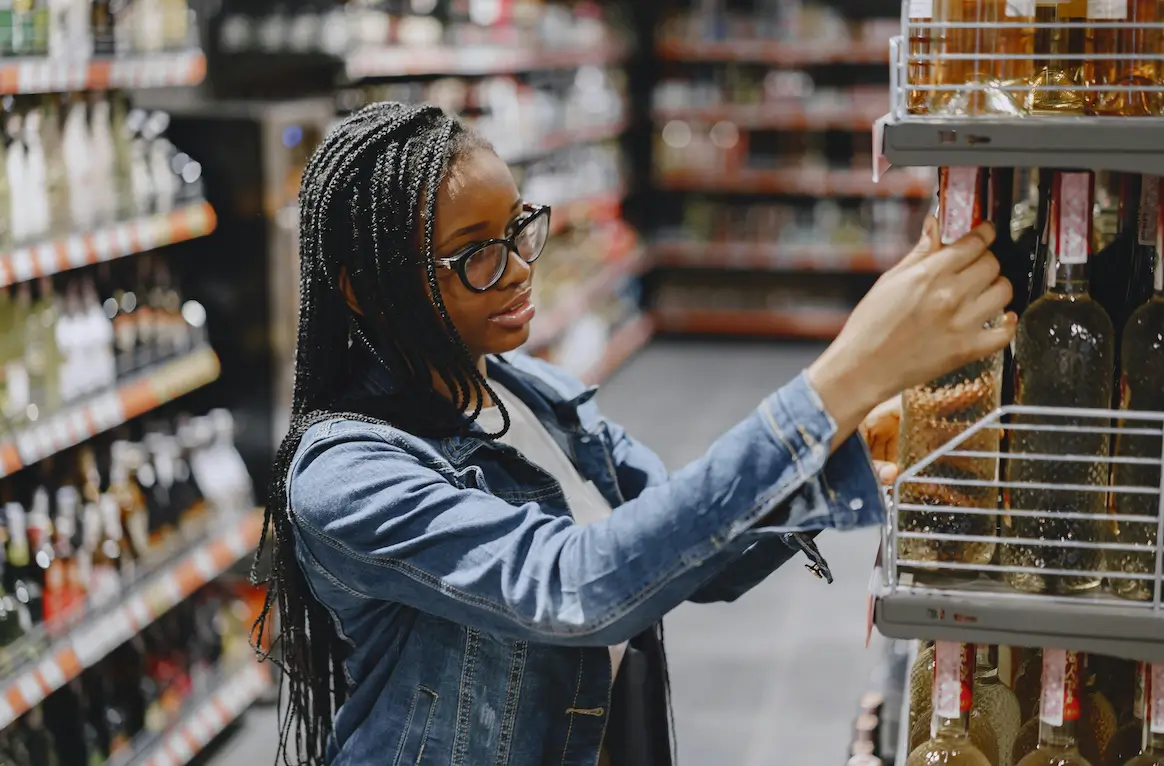Best POS Systems for Liquor Stores in 2026
A POS (point of sale) system is more than just a cash register. It’s the brain of your shop. It tracks sales, manages inventory, handles payments, and keeps your business running smooth. In the liquor game, where margins are tight and rules are strict, the right system isn’t just helpful—it’s essential.
 Liquor stores are a niche kind of retail. You’ve got age checks to handle, bottle deposits to track, split-case pricing, and shelves packed with fast-moving inventory. The right liquor shop POS system can simplify compliance, speed up checkouts, stay on top of inventory, and keep customers moving without slowing your business down.
Liquor stores are a niche kind of retail. You’ve got age checks to handle, bottle deposits to track, split-case pricing, and shelves packed with fast-moving inventory. The right liquor shop POS system can simplify compliance, speed up checkouts, stay on top of inventory, and keep customers moving without slowing your business down.
Best POS Systems for Liquor Stores in 2026
⭐ Lightspeed: Best for advanced inventory
⭐ Korona POS: Best for high-volume stores
⭐ Shopify: Best for liquor stores selling both in-store and online
⭐ Clover: Best for quick setups
⭐ Epos Now: Best for liquor stores on a budget
⭐ POS Nation: Best for personalized support
Quick Comparison
| POS System | Standout Feature | Best For | Age Verification | Case Break Pricing |
| Lightspeed | Advanced inventory control | Multi-location inventory | ✅ | ✅ |
| Korona POS | Compliance & reporting | Regulation-heavy states | ✅ | ✅ |
| Shopify | Omnichannel selling | Online + retail combo | ✅ | ❌ |
| Clover | User-friendly hardware | Small shops | ❌ | ❌ |
| Epos Now | Low-cost setup | New liquor stores | ❌ | ❌ |
| POS Nation | Liquor-specific tools | Custom setups | ✅ | ✅ |
Our Top Picks
There’s no one-size-fits-all when it comes to POS systems, especially in the liquor business. Some stores need heavy-duty inventory tools, others want something simple that just works at the counter. We picked the top POS systems that actually deliver for liquor stores—based on features that matter in your world, not just flashy tech stuff. Here’s how each one stacks up.
Lightspeed: Best for advanced inventory
 Advanced inventory management capabilities
Advanced inventory management capabilities  Smarter sales & reporting
Smarter sales & reporting Lightspeed is built for liquor stores that need more than just a basic register. It’s especially strong with inventory—you can manage products by bottle or case, track vendors, automate reorders, and set custom pricing rules without breaking a sweat. It’s also great for multi-location setups, letting you keep everything synced across shops. If your store carries a wide range of SKUs or moves high volume, Lightspeed keeps things organized and running smoothly, making it a solid pick for the best POS system for liquor stores.
Key Features
- Inventory tracking by bottle, case, or pack
- Multi-location management with centralized control
- Vendor management and automated purchase orders
- Custom pricing rules (mix-and-match, bulk discounts, promos)
- Built-in age verification prompts
- Real-time sales and stock reporting
- E-commerce integration (if you’re selling online too)
Pros and Cons
Pros
- Detailed inventory control that works well for large selections
- Supports bottle, case, and split-pack pricing
- Great for managing multiple store locations
- Built-in age verification
- Clean interface with a user-friendly backend
Cons
- Might be more than you need if you’re running a simple setup
- Some features take time to learn or require proper onboarding
Who It’s For
Lightspeed is a solid fit for liquor store owners who need tight control over inventory, especially if you’re managing a large product list or running multiple locations. It’s best for shops that want depth—automated ordering, detailed reports, custom pricing—without sacrificing speed at the counter. If you’re scaling up or already running a busy operation, Lightspeed’s got the tools to keep up.
Korona POS: Best for high-volume stores
 No contracts or hidden fees
No contracts or hidden fees  Advanced reporting accessible from anywhere
Advanced reporting accessible from anywhere Korona POS is designed for liquor stores that move fast and need to stay compliant. It’s strong on age verification, tax handling, and sales tracking—making it easier to stay on top of the details that can trip you up. Case break pricing, bottle deposits, and inventory tools are all built in, so you’re not relying on workarounds. Whether you’re dealing with high foot traffic or just want a system that keeps things tight behind the scenes, Korona delivers what a POS system liquor store actually needs.
Key Features
- Built-in age verification at checkout
- Case break pricing and bottle deposit tracking
- Real-time sales and inventory reporting
- Advanced tax settings for compliance
- Loss prevention tools and user permissions
- Cloud-based access with offline mode
- Integrates with payment processors and accounting software
Pros and Cons
Pros
- Handles compliance and age checks without extra steps
- Strong reporting tools for sales, taxes, and performance
- Supports case breaks and deposit tracking out of the box
- Scales well for high-traffic or multi-location stores
- Cloud-based but works offline when needed
Cons
- Interface isn’t the flashiest
- Some setup and customization can take time upfront
Who It’s For
Korona POS is a smart pick for liquor stores that deal with volume, compliance, or both. It’s built for shop owners who need solid backend tools—like tax reporting, case break pricing, and loss prevention—without slowing down day-to-day sales. If you’re in a busy area, run multiple stores, or want something reliable that handles the complex stuff behind the scenes, Korona fits the bill.
Shopify: Best for liquor stores selling both in-store and online
 Process digital wallets & popular payments
Process digital wallets & popular payments  Personalize marketing to boost loyalty
Personalize marketing to boost loyalty Shopify is a strong POS system for liquor stores that want to sell both in-store and online without the headaches. It keeps inventory synced across all channels, so whether a customer walks in for a bottle or places an order for pickup or delivery, everything stays accurate. The interface is clean, easy to train staff on, and highly customizable thanks to Shopify’s huge app ecosystem. For liquor stores looking to grow, streamline sales, and stay organized across platforms, it’s a top-tier liquor store POS system.

Key Features
- Unified inventory for in-store and online sales
- Built-in tools for local pickup and delivery
- Easy-to-use POS hardware and interface
- Customizable with apps for age verification, promotions, and loyalty
- Real-time sales and stock tracking across channels
- Secure payment processing with multiple options
- Customer profiles and order history for marketing or loyalty
Pros and Cons
Pros
- Syncs online and in-store inventory automatically
- Great for stores offering pickup, delivery, or shipping
- Simple interface that’s easy to train staff on
- Tons of app integrations for custom needs
- Clean hardware options and reliable performance
Cons
- Some liquor-specific features may require third-party apps
- Not ideal if you’re strictly in-store with no plans for online sales
Who It’s For
Shopify is a great fit for liquor stores that want to sell both online and in-store without juggling separate systems. It’s especially useful for shops offering local delivery, in-store pickup, or shipping gift sets. If your business is growing beyond the four walls of your store—or you want to future-proof it—Shopify gives you the tools to handle both sides smoothly.
Clover: Best for quick setups
 Cloud-hosted & accessible from anywhere
Cloud-hosted & accessible from anywhere  Accept payments & track inventory
Accept payments & track inventory Clover is a sleek, all-in-one POS system that’s easy to set up and even easier to use. For liquor stores, it offers fast checkout, solid payment processing, and a growing app market to fill in the gaps—like age verification or basic inventory tools. It runs on proprietary hardware, which looks good on the counter and doesn’t require much tech know-how to get started. While it’s not built specifically for liquor stores, its flexibility makes it a good choice for owners who want a no-fuss system that gets the job done.

Key Features
- Fast, reliable checkout with built-in payment processing
- App marketplace for add-ons like age verification and inventory tools
- Customizable hardware options (registers, tablets, mobile terminals)
- Basic inventory management and low-stock alerts
- Customer management tools and digital receipts
- Cloud-based with real-time reporting
- Easy staff setup and user permissions
Pros and Cons
Pros
- Quick and easy to set up, even with no tech background
- Sleek hardware that fits well in a retail space
- App marketplace gives flexibility to add features as needed
- Fast checkout and smooth payment processing
- Simple interface makes training staff easy
Cons
- Not built specifically for liquor stores—some key features need third-party apps
- Hardware is proprietary, so you’re locked into Clover’s ecosystem
Who It’s For
Clover is a solid option for liquor store owners who want something easy, clean, and ready to go out of the box. It’s especially good for smaller shops or new store owners who don’t need tons of advanced features but still want a modern setup that looks good and runs smooth. If you’re more focused on speed and simplicity than deep customization, Clover gets the job done.
Epos Now: Best for liquor stores on a budget
 100+ app integrations for your business
100+ app integrations for your business  Business reporting available in real-time
Business reporting available in real-time Epos Now is a cloud-based POS system that gives liquor stores the core tools they need to run daily operations—without the bells and whistles that drive up costs. It supports inventory tracking, staff management, and basic reporting, with options to add features through its app store. The system works with a variety of hardware setups, so you’re not boxed into one layout. It’s built to be flexible and accessible, making it easy to get started and keep things moving behind the counter.
Key Features
- Inventory tracking with support for bottle and case management
- Customizable product modifiers and pricing
- Cloud-based access with real-time updates
- Basic reporting on sales, stock levels, and staff activity
- App store for adding features like age verification and CRM tools
- Works with a wide range of hardware setups
- Simple staff permissions and user roles
Pros and Cons
Pros
- Affordable entry point for small or new liquor stores
- Easy to set up and use with minimal training
- Flexible hardware options—use what you have or buy from them
- Inventory tools cover basic liquor store needs
- Can be customized with apps as your business grows
Cons
- Liquor-specific features aren’t built in—you’ll need add-ons
- Reporting and analytics are more basic compared to higher-end systems
Who It’s For
Epos Now is a good fit for liquor store owners who want a simple, cost-effective system to cover the basics. It’s ideal for smaller shops or new businesses that need inventory tracking, staff management, and a smooth checkout—without paying for features they won’t use. If you’re looking for something flexible and budget-friendly that you can build on later, Epos Now gets the job done.

POS Nation: Best for personalized support
 Advanced inventory management & reporting
Advanced inventory management & reporting  Process remote payments with virtual POS
Process remote payments with virtual POS POS Nation is a liquor store–focused POS system that comes ready with the features most shops usually have to add on. It supports age verification, case break pricing, bottle deposit tracking, and detailed inventory tools right out of the gate. Designed for Windows-based hardware, it’s customizable and backed by solid customer support to help you get up and running smoothly. It’s a strong all-in-one option for liquor store owners who want a system tailored to their day-to-day needs.
Key Features
- Built-in age verification at checkout
- Case break and mix-and-match pricing support
- Bottle deposit tracking and tax configuration
- Inventory management for high-SKU environments
- Customer profiles and loyalty program tools
- Barcode label printing and scanning
- US-based support with setup and training included
Pros and Cons
Pros
- Liquor-specific features are built in—no need for extra apps
- Handles complex pricing and compliance with ease
- Strong inventory tools for large product catalogs
- Personalized onboarding and customer support
- One-time payment and monthly plans available
Cons
- Runs on Windows hardware, which may not appeal to everyone
- The interface feels a bit dated compared to newer cloud-based systems
Who It’s For
POS Nation is built for liquor store owners who want a system that’s ready to go—no workarounds, no extra apps. It’s ideal for stores with complex pricing, high SKU counts, or strict compliance needs. If you want something tailored to the liquor industry, with support that actually understands how your store runs, POS Nation is a solid choice.
Related Articles
Why a Great POS System Matters for Liquor Stores
Running a liquor store isn’t just about ringing people up and restocking shelves. You’ve got tight margins, strict compliance rules, and a ton of moving parts—inventory, pricing, deposits, age checks, and more. If your POS system isn’t built to handle all that, you’re stuck doing double work, fixing mistakes, or losing track of what’s actually moving.
A great liquor store POS system keeps everything running smoothly behind the scenes. Here’s what it helps you do:
- Stay compliant – Age verification, tax rules, and bottle deposit tracking done right, every time.
- Move faster at checkout – No bottlenecks, no errors—just clean, quick transactions.
- Track inventory without the headache – Know what’s selling, what’s low, and when it’s time to reorder.
- Handle case breaks and promos – Custom pricing by the bottle, case, or mix-and-match deals.
- Make smarter business calls – Real-time data helps you order better, stock smarter, and avoid dead weight on the shelves.
The best POS provider for liquor stores should do more than process payments. It should take pressure off your team and give you the tools to run your store better.
Things to Consider When Choosing a POS System for Your Liquor Store
Not all POS systems are built for liquor. Some are made for coffee shops, others for fashion boutiques—and forcing those setups into a liquor store usually ends in frustration. Here’s what to look for when picking the right one for your shop:
- Age verification – This isn’t optional. Your POS should prompt and log age checks without slowing things down.
- Liquor-specific pricing tools – Can it handle bottle vs. case pricing? Mix-and-match deals? Deposit tracking?
- Inventory management – You want to track SKUs down to the brand, flavor, and size—without a spreadsheet.
- Ease of use – You don’t have time to train for weeks. It should be quick to learn and simple to use.
- Speed and reliability – Checkout needs to move fast, especially on weekends and holidays.
- Integration with other tools – If you’re also selling online, running promotions, or using accounting software, your POS should sync up.
- Support that gets your business – If something goes wrong, you want a support team that understands liquor—not someone asking what a bottle deposit is.
Pick a system that’s built for liquor, not one you have to bend to fit your store.

What POS Features Matter Most for Your Liquor Store?
Small, single-location stores
Need quick setup, easy-to-use interfaces, and essential tools like age verification and basic inventory.
Example: A neighborhood shop using Clover for fast transactions and simple age checks.
Multi-location operations
Need centralized inventory control, location-specific reporting, and multi-store syncing.
Example: A local chain using Lightspeed to manage stock across three stores and reorder automatically.
High-volume liquor stores
Need fast checkout, detailed reporting, and tools to handle case breaks, deposits, and custom pricing.
Example: A busy urban store using Korona POS for compliance, speed, and strong inventory tracking.
Liquor stores with online sales
Need ecommerce integration, synced inventory, and tools for local pickup or delivery.
Example: A hybrid shop using Shopify to sell both in-store and online with unified reporting.
New or budget-conscious stores
Need a system that’s affordable but still covers the essentials like age checks and inventory basics.
Example: A new liquor store using Epos Now to get started without overspending.
Custom, full-feature setups
Need advanced liquor features, strong support, and tailored onboarding.
Example: A specialty wine and spirits store using POS Nation for built-in tools and industry-specific support.
Different stores, different needs—but the right POS system for liquor stores will match how you operate and help you scale when you’re ready.
The Bottom Line
Your POS system runs the heart of your liquor store—so it better be built for it. From age checks and case pricing to inventory tracking and compliance, the right setup keeps your store moving and your margins tight. Whether you’re just opening your doors or managing multiple locations, a good POS system liquor store owners can rely on should make everyday operations smoother, not more complicated.
Pick the one that fits your work style. When your POS is dialed in, everything else flows.
FAQ
Q: What is the best POS system for liquor stores?
A: The best POS system for liquor stores depends on your store’s size, setup, and needs. POS Nation is a top choice for liquor-specific features out of the box, while Lightspeed is ideal for multi-location inventory and Shopify works well for stores with online sales.
Q: Do liquor stores need a special POS system?
A: Yes, liquor stores benefit from a POS system designed for the industry. A liquor-specific POS includes key features like age verification, bottle deposit tracking, case break pricing, and compliance tools that standard retail systems often lack.
Q: What features should a liquor store POS system have?
A: Must-have features include age verification, case and bottle pricing, inventory management, bottle deposit support, sales reporting, and compliance tracking. Systems like Korona POS and POS Nation offer many of these tools built in.
Q: Can I use Shopify POS for a liquor store?
A: Yes, Shopify POS works well for liquor stores that sell both in-store and online. It syncs inventory across sales channels, supports local delivery and pickup, and integrates with apps for age verification and compliance.
Q: How much does a liquor store POS system cost?
A: Most liquor store POS systems range from $30 to $150 per month. Some providers, like POS Nation, also offer one-time payment options. Costs vary based on features, hardware, and support needs.
Q: What is case break pricing in a liquor store POS?
A: Case break pricing allows liquor stores to sell products by the bottle or by the case, with different pricing for each. A good liquor store POS system should handle this automatically, helping you set custom rules and track inventory accurately.
Q: Can a liquor store POS system help with compliance?
A: Yes, a liquor store POS system can assist with compliance by logging age verification, managing tax rules, tracking bottle deposits, and restricting employee permissions to avoid illegal sales.






